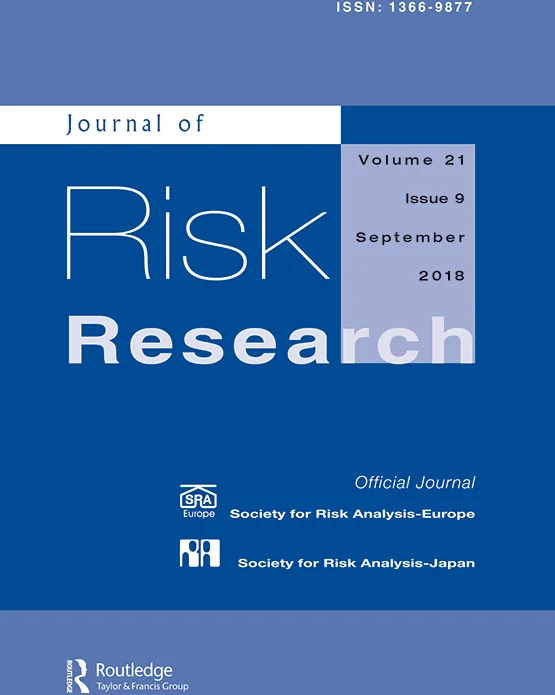危机社会感知:公共卫生危机期间对系统性风险的社会感知的纵向监测
IF 1.7
4区 管理学
Q1 SOCIAL SCIENCES, INTERDISCIPLINARY
引用次数: 0
摘要
监测不同的人——作为“社会传感器”——如何评估和应对诸如流行病之类的危机,可以根据不同时刻对形势的社会感知来调整危机沟通。为了收集这些证据,我们提出了一个系统性风险的社会感知指数(SPSR),作为对身体健康、心理健康、经济、社会关系、卫生系统和其他方面危害风险的情境威胁的指标。该指标是一项适用于危机局势的社会感知方法的核心,该方法在2019冠状病毒病大流行期间通过对Facebook™用户在2019冠状病毒病相关出版物中发表的13万多条公众评论进行内容分析而实施。该内容编码允许创建在为期一年的描述性纵向分析期间监测的SPSR指数。该指数与社会系统内共同发生的事件相关,即跨测量周期的流行病学指标(例如,新死亡;累计感染病例数;重症监护病房住院),并倾向于反映流行病学情况的严重程度(例如,在最严重的大流行浪潮期间登记的最高水平)。然而,也存在差异,在严重程度较低的情况下,即住院和死亡人数较低(如学年开始),或在严重程度较高的情况下(如圣诞节期间的第二次大流行浪潮),登记的特殊防范风险较高,这表明除流行病学情况外,还有其他因素影响了社会看法。在SPSR达到峰值的每个“危机期”之后,都有一个“恢复期”,不断向前一个测量周期的平均水平下降。这既可以表明社会弹性(恢复和资源增强),也可以表明在高严重性时期后风险的衰减。本研究作为危机社会感知方法概念的初步证明,能够监测各种危机类型(如健康危机或气候危机)的社会系统动态。本文章由计算机程序翻译,如有差异,请以英文原文为准。
Crises social sensing: longitudinal monitoring of social perceptions of systemic risk during public health crisis
Abstract Monitoring how different people – as ‘social sensors’ – evaluate and respond to crisis such as pandemics, allows tailoring crisis communication to the social perceptions of the situation, at different moments. To gather such evidence, we proposed a index of social perceptions of systemic risk (SPSR), as an indicator of a situational threat compromising risks to physical health, psychological health, the economy, social relations, health system, and others. This indicator was the core of a social sensing approach applied to crisis situations, implemented during the COVID-19 pandemic through a content analysis of more than 130.000 public comments from Facebook™ users, in COVID-19 related publications. This content coding allowed creating a SPSR index monitored during a one-year descriptive longitudinal analysis. This index correlated with co-occurring events within the social system, namely epidemiological indicators across measurement cycles (e.g. new deaths; cumulative number of infection cases; Intensive Care Unit hospitalizations) and tended to reflect the epidemiological situation severity (e.g. with the highest level registered during the worst pandemic wave). However, discrepancies also occurred, with high SPSR registered in a low severity situation, i.e. low number of hospitalizations and deaths (e.g. school year beginning), or low SPSR in a high severity situation (e.g. 2nd pandemic wave during Christmas), showing other factors beyond the epidemiological situation contributing to the social perceptions. After each ‘crisis period’ with SPSR peaking, there was a ‘restoration period’, consistently decreasing towards average levels of the previous measurement cycle. This can either indicate social resilience (recovery and resources potentiation) or risk attenuation after a high-severity period. This study serves as preliminary proof of concept of a crises social sensing approach, enabling monitoring of social system dynamics for various crisis types, such as health crisis or the climate crisis.
求助全文
通过发布文献求助,成功后即可免费获取论文全文。
去求助
来源期刊

Journal of Risk Research
SOCIAL SCIENCES, INTERDISCIPLINARY-
CiteScore
12.20
自引率
5.90%
发文量
44
期刊介绍:
The Journal of Risk Research is an international journal that publishes peer-reviewed theoretical and empirical research articles within the risk field from the areas of social, physical and health sciences and engineering, as well as articles related to decision making, regulation and policy issues in all disciplines. Articles will be published in English. The main aims of the Journal of Risk Research are to stimulate intellectual debate, to promote better risk management practices and to contribute to the development of risk management methodologies. Journal of Risk Research is the official journal of the Society for Risk Analysis Europe and the Society for Risk Analysis Japan.
 求助内容:
求助内容: 应助结果提醒方式:
应助结果提醒方式:


